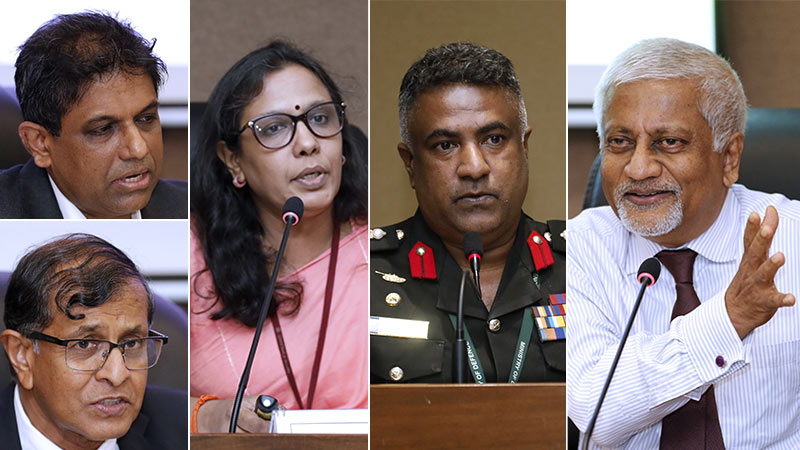INSS roundtable examines Red Sea conflict’s economic risks for Sri Lanka

The Red Sea is a crucial Indian Ocean entrance that is largely anchored by the Suez Canal, in terms of strategic significance between Europe, Asia and Africa, which entered the hot zone of geopolitics.
Compared to other nations not as dependent on international trade, as a small open economy, Sri Lanka is exposed to the risk of Red Sea conflict disruptions.
In light of this, the Institute of National Security Studies (INSS) of Sri Lanka, the premier think tank on national security established and functioning under the Ministry of Defence organized a roundtable on September 02, 2024 entitled, “Widening Red Sea Conflict: Implications for the Global Economy and Sri Lanka”.
The discussion, held at the Ministry of Defence, explored how increased maritime risks, potential diversions in trade routes and economic instabilities can affect Sri Lanka as an island nation.
This discussion on the timely topic was conducted under the guidance and direction of Defence Secretary General Kamal Gunaratne. Chief of National Intelligence (CNI) Maj. Gen. Ruwan Kulathunga (Retd) graced the event as the Chief Guest.
Overlooking Director General and Acting Director (Research) of the INSS, Colonel Nalin Herath warmly received the Chief Guest and the distinguished panelists to the forum. While making the introductory remarks, he also introduced the distinguished moderator and other speakers to the audience.
The central themes of the discussion included an overview of the evolving geopolitical landscape of the Red Sea, the implications of the conflict on the global economy, impacts on Sri Lankan economy and strategies to strengthen economic resilience whilst exploiting the opportunities as a key maritime hub in the Indian Ocean.
The moderator of the event was Dr. Ganeshan Wignaraja, the Professorial fellow in Economics and Trade at Gateway House in Mumbai and Visiting Senior Fellow at ODI in London. Dr. (Mrs.) Sujeetha Jegajeevan, Director of the Economic Research Department at the Central Bank of Sri Lanka, Mr Bingumal Thewarathanthri, the Chief Executive Officer at Standard Chartered Bank in Sri Lanka and Professor Rohan Samarajiva, founding Chair of LIRNEasia (Learning Initiatives on Reforms for Network Economies Asia), acted as key speakers of the event.
Dr. Jegajeevan highlighted that maintaining prudent macroeconomic policies was important to tackle the economic fallout on Sri Lanka from a possible widening of the Red Sea conflict. Mr. Thewarathanthri indicated the significance of consistent economic policies to support business and signing trade deals with Sri Lanka’s major trading partners.
Professor Samarajiva suggested that Sri Lanka’s comparative advantage lies in services (such as ICT services) and that investing in innovation and cyber security were essential. Dr. Ganeshan Wignaraja summarized the main points expressed by the speakers and suggested that the government needs to maintain a razor sharp focus on ensuring economic security for the country to move from debt default status to economic prosperity.
The audience consisted of Defence Ministry officials, academics, researchers, scholars, policymakers, representatives from the Sri Lanka Armed Forces, Sri Lanka Police and other international subject experts.
(Ministry of Defence)
Latest Headlines in Sri Lanka
- Police open fire on fleeing vehicle, arrest couple with cannabis in Hokandara February 24, 2025
- Petitions against Deshabandu’s IGP appointment fixed for hearing February 24, 2025
- Sri Lanka’s Defence Secretary orders immediate arrest of military deserters February 24, 2025
- PM Rejects Nalin Hewage’s remarks on MP Rohini Kavirathna February 23, 2025
- Sri Lanka President: No threat to national security, gang wars under investigation February 23, 2025


